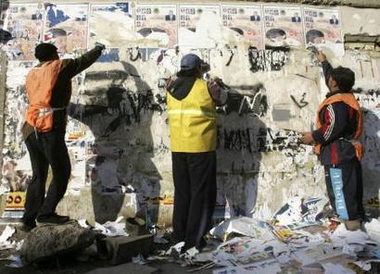|
Iraq's Sunni Arabs say elections tainted
(AP)
Updated: 2005-12-21 08:54
Sunni Arabs and a key secular party charged Tuesday that parliamentary
elections were tainted by fraud, and demanded an inquiry into preliminary
results showing the governing Shiite religious bloc with a larger than expected
lead.
With politicians barely containing their hostility toward each other, the
bitter climate raised questions about U.S. hopes that the Dec. 15 vote will lead
to a more inclusive government involving Sunni Arabs, the minority group that
formed the core of Saddam Hussein's government and is now the backbone of the
insurgency.
The complaints focused mainly on Baghdad, Iraq's largest electoral district
and one that has large numbers of Sunnis and Shiites. With 89 percent of ballot
boxes counted, the Shiite bloc United Iraqi Alliance were leading in the
province with about 59 percent of the vote, while the Sunni Arab alliance, the
Iraqi Accordance Front, trailed with 19 percent.
Adnan al-Dulaimi, head of the Sunni Arab alliance the Iraqi Accordance Front,
listed several complaints, including voting centers failing to open, shortages
in election materials and reports of multiple voting.
"There are many violations and there is forgery," al-Dulaimi told The
Associated Press, saying his group would demand a new vote in Baghdad if the
problems are not addressed.

Iraqi workers remove election posters from a
wall in central Baghdad December 20, 2005.
[Reuters] | Electoral commission official Farid Ayar said he has received more than 1,000
formal complaints, 20 of which were serious, or "red." He said he did not expect
the complaints would change the overall result, which is to be announced in
January.
U.S. Ambassador Zalmay Khalilzad said "final results will not be announced
until those red complaints have been looked at."
But a secular coalition charged that the election commission was a tool of
the religious Shiite-dominated government.
"The elections commission is not independent. It is influenced by political
parties and by the government," said Ibrahim al-Janabi, an official with Iraqi
National List, which is headed by former prime minister Ayad Allawi.
By the latest count, the Iraq National List received 14 percent of the votes
in Baghdad province, a distant third. Adel al-Lami, the general director of
Iraq's electoral commission, told The Associated Press that officials did not
announce the results of the remaining 11 percent because of complaints of
irregularities.
The Iraqi Accordance Front, a coalition of three Sunni groups, rejected the
results, warning of "grave repercussions on security and political stability" if
the mistakes were not corrected. Al-Dulaimi said that if changes weren't made
Sunni Arabs "will resort to other measures" he did not specify.
A senior member of the United Iraqi Alliance, Jawad al-Maliki, retorted that
the Sunni minority should accept the will of the majority.
"We cannot ignore the facts on the ground," al-Maliki said. "Democracy means
accepting the opinion of the majority. They should accept the other and the
outcome of the ballot boxes. The Sunnis need to take this into consideration."
Sunni Arabs fear being underrepresented and marginalized. Most estimates say
they make up about 20 percent of the country, though al-Dulaimi claimed they
comprise about 40 percent �� a common Sunni assertion.
Preliminary results from 11 of the 18 provinces showed the United Iraqi
Alliance winning strong majorities not only in Baghdad but in the largely Shiite
provinces in the south.
A senior member of the Alliance, Hussain al-Shahristani, predicted the bloc
would receive about 130 seats �� 10 fewer than they have now. But unlike last
January's elections, which most Sunni Arabs boycotted, this time the Sunnis
voted in large numbers.
Kurdish parties were overwhelmingly ahead in their three northern provinces,
while results from one of the four predominantly Sunni Arab provinces,
Salahuddin, showed the Sunni Arab minority winning in a landslide.
But even the Kurds, the junior partner in the current government, were
leveling accusations of irregularities. Iraq's Kurdish president, Jalal
Talabani, said 25,000 residents of Sulaimaniyah, 160 miles northeast of Baghdad,
were not on the rolls despite having voted in the last election.
The accusations came as the U.S. ambassador warned that sectarianism only
increases the risk of violence and said Iraq needs a governing coalition which
bridges the divide.
"It looks as if people have preferred to vote for their ethnic or sectarian
identities," Khalilzad said. "But for Iraq to succeed there has to be
cross-ethnic and cross-sectarian cooperation. Sectarianism undercuts prospects
for success and increases the risk for conflict among sects."
When the votes are certified, the Shiite religious bloc will likely fall
short of the 184 seats necessary to form a government and will have to find a
coalition partner in the 275-member parliament.
Although the trend of ethnic and religious-minded voting did not come as a
surprise, the Bush administration had hoped for a better showing by the Allawi's
alliance.
The election was to select Iraq's first full-term parliament since the end of
Saddam's dictatorship in 2003. On Wednesday, Saddam was expected to return to
court for his trial on mass murder charges.
Violence persisted Tuesday.
In Ramadi, 70 miles west of Baghdad, gunmen killed a Sunni clerics, Imam Amer
al-Alwani, outside his home, police said. In the west of the city, clashes
between a U.S. patrol and insurgents trying to plant a bomb wounded an
insurgent, police said.
In the capital, a driver for the Jordanian Embassy was kidnapped as he drove
to work. The Jordanian was the latest of some 240 foreign hostages seized in
Iraq.
|